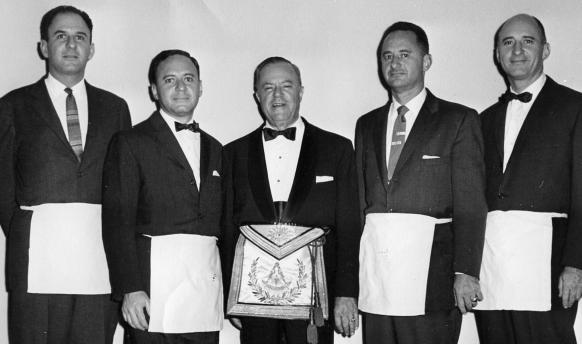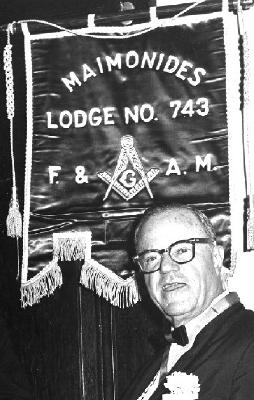
Abe's father Philip Krakauer had also been a member of both of these organizations. Both Philip and later Abe served as Master of their Masonic "Lodge", the Maimonides Lodge #743, and Abe later served as the Grand Representative of the Grand Lodge of New York to the Grand Lodge of Israel (the Masons like to use the word "grand" a lot). Note 1 Only men can be admitted as Masons. In my youth, women were traditionally excluded from what were called, after all, "fraternal organizations". Nowadays, many traditionally male college fraternities are accepting women as members. To be a Mason, you also have to believe in a "supreme being", although the interpretation of exactly what that means to you is not explored in any depth. When I became involved with the Masons, I remember that part of the ritual involved an oath to never knowingly allow a woman or an atheist to become a member. I never understood just what the Masons had against atheists. All the atheists I know are perfectly nice people. But it's a form of religious bigotry that's shared by a great many people in the United States, including, for example, the national organization of that otherwise admirable organization, the Boy Scouts of America®. Note 2 In the tradition of my grandfather's Lodge, the Masons did not recruit new members. In theory, people would find out on their own about Masonry, perhaps by meeting members of the Lodge. They could then express an interest in joining on their own initiative. I think that these days the Masons may be having trouble finding new young members, because they seem to be conducting a TV advertising campaign to get people interested in joining. This directs you to a webpage called http://askafreemason.org/, where you can find out more about the organization. I doubt if my father expressed an interest in Masonry on his own, and besides, he had become an atheist while a college student at Cornell University. So despite the non-recruiting tradition of his lodge, I suspect that it was Abe who urged his sons to become Masons. You couldn't become a Mason until you reached adulthood, which if I'm remembering correctly was defined as 18 years of age, so my father would have become eligible in 1933, when he was a college student. But Abe had a better plan. He "saved up" his four sons until the youngest, Bill, was eligible, about ten and a half years after my father, who was the oldest. Only then did he have all four of his sons inducted into the Masons together. This event was a first in the history of Maimonides Lodge: four sons being simultaneously "raised" as "entered apprentices", to use Masonic jargon. Of course, from what I've said above, you can see that it's likely that there was another "first" involved: I suspect my father Daniel was the first atheist member of Maimonides Lodge. That raises an interesting question in my mind: did Abe know about this? After all, if he did, he had violated his oath to never knowingly allow a woman or an atheist to become a member of the Lodge. I suppose it's possible that he didn't know about my father's religious beliefs, or perhaps he simply didn't want to know, or didn't care. Shortly after I turned 18, my father approached me with some hesitation. He told me that Abe had in mind another "first". If I myself applied to Maimonides Lodge for membership, and was accepted, I would become the very first fourth-generation member of that Lodge. Would I be willing to do that? Now, I've never felt particularly interested in fraternal organizations. In college at the time, I was living in a dormitory, and had never been interested in joining a fraternity. I felt no particular urge to join the Masons. On the other hand, I had nothing against the organization, and if it would make my grandfather happy, why not? So on one of my trips to New York, I found myself being interviewed by an imposing committee of Masonic Grand Masters and past Grand Masters, the committee lacking only my grandfather, who had excused himself based on conflict of interest. They asked me if I believed in God, and I said yes. They then asked me how my belief in God was manifest. I didn't initially know how to answer this, since not having a belief in God in actuality, it wasn't particularly manifest in any way at all. I quickly said something about giving to charity and doing good works, which seemed to surprise my questioners. Apparently, they expected me to answer by citing membership in some religious organization, such as a temple (the membership of this particular Lodge was almost exclusively Jewish). In any event, I passed the interview, which I think was a foregone conclusion unless I had messed up really badly. I then had to go through an education program in Masonic rituals. Although I'm no longer a Mason, I see no particular reason to reveal any of their secrets here, although to tell you the truth I think they are now all available on the web somewhere. I had to memorize responses to questions which I would be asked during various ceremonies, and I was quizzed on producing these answers from memory. I don't really remember all the details, but there was a good deal of preparation involved. Fortunately, I've always had a very good rote memory, and I certainly didn't have any trouble with it. Because the Lodge I was joining was in New York City, and I was attending college in Cambridge, Massachusetts, I was connected to a Masonic Lodge in Framingham, where I could undergo much of the training. Thus, I didn't have to travel into New York for every session. But ultimately, when I was initiated as an entered apprentice, it was of course at the Maimonides Lodge in New York. The Lodge made rather a fuss over this event, as I was a young person in a lodge that was turning quite elderly, and of course I was the first fourth-generation member to ever be admitted. My grandfather presented me with a Masonic lapel pin to wear, and bought me a lifetime membership to the Lodge. The event brought together all my uncles, shown in the photo below taken on October 25, 1961. You can click on the photo to enlarge it, and then return here with your browser's "Back" button.  Because after graduating college I never again lived in the greater New York area, I had a perfect excuse to not be involved in any meetings and other events. Thus, being a Mason was never any sort of burden to me, even though I really had no interest in participating. I did have to pay my dues annually, a rather modest $12, as I recall. The dues were so low because of the lifetime membership my grandfather had presented me with, but were probably charged so the organization could know when an inactive member had died. After Abe died, I continued paying these dues for a few years, but then decided that it no longer served any purpose. I thought I might notify the Masons that I was dropping my membership, but I did take the trouble to check with my uncles, to see if they would have any objection. None did, and my uneventful career with the Masons came to an end.
  Note 1: The photo was provided by my cousin Steve Krakauer. There seems to be more than one Masonic Lodge with "Maimonides" in its name. Masonic lodges have numbers, such as the Maimonides Marshall Lodge #739, that meets in Manhattan (New York City). And a little web research shows that Abe's lodge, number 743, has since merged into number 739. [return to text] Note 2: On the web site of the Boy Scouts of America, on a page about the "Duty to God Breakfast", the founder of Scouting, Lord Baden Powell, is quoted as saying, "No man can be really good if he doesn't believe in God and he doesn't follow His laws." In my opinion, this is blithering nonsense, and is religious bigotry of the worst kind (see, for example, the book Good Without God, by Greg M. Epstein, among other sources). Lest you think this is just the position of its founder, I'll point out that the Boy Scouts to this day take the position that atheists and agnostics cannot participate as Scouts. Yes, agnostics - you only have to doubt the existence of God to not be allowed to be a scout. [return to text]
 |
